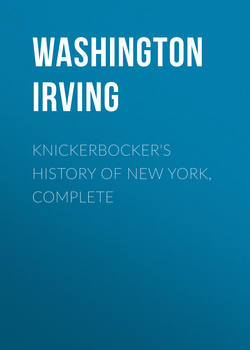Knickerbocker's History of New York, Complete

Реклама. ООО «ЛитРес», ИНН: 7719571260.
Оглавление
Washington Irving. Knickerbocker's History of New York, Complete
VOLUME I
INTRODUCTION
THE AUTHOR'S APOLOGY
Notices
ACCOUNT OF THE AUTHOR
TO THE PUBLIC
BOOK I. CONTAINING DIVERS INGENIOUS THEORIES AND PHILOSOPHIC SPECULATIONS, CONCERNING THE CREATION AND POPULATION OF THE WORLD, AS CONNECTED WITH THE HISTORY OF NEW YORK
CHAPTER I
CHAPTER II
CHAPTER III
CHAPTER IV
CHAPTER V
BOOK II. TREATING OF THE FIRST SETTLEMENT OF THE PROVINCE OF NIEUW NEDERLANDTS
CHAPTER I
CHAPTER II
CHAPTER III
CHAPTER IV
CHAPTER V
CHAPTER VI
CHAPTER VII
CHAPTER VIII
CHAPTER IX
BOOK III. IN WHICH IS RECORDED THE GOLDEN REIGN OF WOUTER VAN TWILLER
CHAPTER I
CHAPTER II
CHAPTER III
CHAPTER IV
CHAPTER V
CHAPTER VI
CHAPTER VII
CHAPTER VIII
CHAPTER IX
BOOK IV. CONTAINING THE CHRONICLES OF THE REIGN OF WILLIAM THE TESTY
CHAPTER I
CHAPTER II
CHAPTER III
CHAPTER IV
CHAPTER V
VOLUME II
INTRODUCTION
HISTORY OF NEW YORK. BOOK IV. (continued.)
CHAPTER VI
CHAPTER VII
CHAPTER VIII
CHAPTER IX
CHAPTER X
CHAPTER XI
CHAPTER XII
BOOK V. CONTAINING THE FIRST PART OF THE REIGN OF PETER STUYVESANT, AND HIS TROUBLES WITH THE AMPHICTYONIC COUNCIL
CHAPTER I
CHAPTER II
CHAPTER III
CHAPTER IV
CHAPTER V
CHAPTER VI
CHAPTER VII
CHAPTER VIII
CHAPTER IX
BOOK VI. CONTAINING THE SECOND PART OF THE REIGN OF PETER THE HEADSTRONG, AND HIS GALLANT ACHIEVEMENTS ON THE DELAWARE
CHAPTER I
CHAPTER II
CHAPTER III
CHAPTER IV
CHAPTER V
CHAPTER VI
CHAPTER VII
CHAPTER VIII
CHAPTER IX
BOOK VII. CONTAINING THE THIRD PART OF THE REIGN OF PETER THE HEADSTRONG – HIS TROUBLES WITH THE BRITISH NATION, AND THE DECLINE AND FALL OF THE DUTCH DYNASTY
CHAPTER I
CHAPTER II
CHAPTER III
CHAPTER IV
CHAPTER V
CHAPTER VI
CHAPTER VII
CHAPTER VIII
CHAPTER IX
CHAPTER X
CHAPTER XI
CHAPTER XII
CHAPTER XIII
Отрывок из книги
KNICKERBOCKER'S HISTORY OF NEW YORK is the book, published in December, 1809, with which Washington Irving, at the age of twenty-six, first won wide credit and influence. Walter Scott wrote to an American friend, who sent him the second edition —
Washington Irving was the son of William Irving, a sturdy native of the Orkneys, allied to the Irvines of Drum, among whose kindred was an old historiographer who said to them, "Some of the foolish write themselves Irving." William Irving of Shapinsha, in the Orkney Islands, was a petty officer on board an armed packet ship in His Majesty's service, when he met with his fate at Falmouth in Sarah Sanders, whom he married at Falmouth in May, 1761. Their first child was buried in England before July, 1763, when peace had been concluded, and William Irving emigrated to New York with his wife, soon to be joined by his wife's parents.
.....
The next inquiry at which we arrive in the regular course of our history is to ascertain, if possible, how this country was originally peopled – a point fruitful of incredible embarrassments; for unless we prove that the aborigines did absolutely come from somewhere, it will be immediately asserted in this age of scepticism, that they did not come at all; and if they did not come at all, then was this country never populated – a conclusion perfectly agreeable to the rules of logic, but wholly irreconcilable to every feeling of humanity, inasmuch as it must syllogistically prove fatal to the innumerable aborigines of this populous region.
To avert so dire a sophism, and to rescue from logical annihilation so many millions of fellow-creatures, how many wings of geese have been plundered! what oceans of ink have been benevolently drained! and how many capacious heads of learned historians have been addled and for ever confounded! I pause with reverential awe when I contemplate the ponderous tomes in different languages, with which they have endeavored to solve this question, so important to the happiness of society, but so involved in clouds of impenetrable obscurity. Historian after historian has engaged in the endless circle of hypothetical argument, and, after leading us a weary chase through octavos, quartos, and folios, has let us out at the end of his work just as wise as we were at the beginning. It was doubtless some philosophical wild-goose chase of the kind that made the old poet Macrobius rail in such a passion at curiosity, which he anathematises most heartily as "an irksome, agonising care, a superstitious industry about unprofitable things, an itching humor to see what is not to be seen, and to be doing what signifies nothing when it is done." But to proceed.
.....